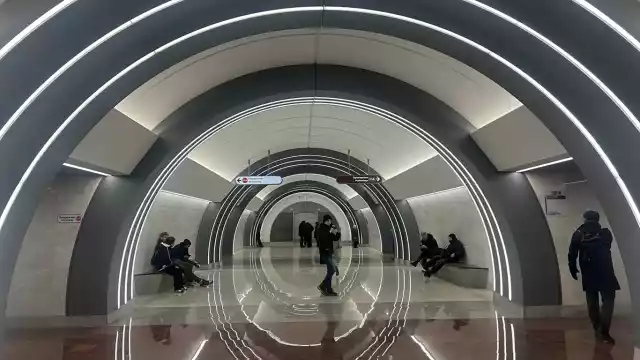An unexpected chill settled over normally warm Russian-German relations on Thursday, when a prominent German analyst was refused entry into Russia for security reasons and the German Foreign Ministry angrily summoned Moscow's envoy in protest.
Hans-Henning Schröder, an expert in Russia's political development at the Berlin-based German Institute of International and Security Affairs, was supposed to address a Moscow conference on government relations Friday. Instead, he spent Wednesday night in a Domodedovo Airport holding cell together with deportees from former Soviet republics and was put on a plane to Berlin on Thursday.
Speaking by telephone after his return to Berlin, Schröder said border guards told him upon his arrival Wednesday afternoon that he had been blacklisted but could not provide further explanation.
"All they could tell me was that I was barred from entering according to Article 27 of the federal migration law," he said.
The article stipulates that entry can be refused to foreigners who present a threat to national security.
"I am nonplussed," he said.
The German Foreign Ministry told Deputy Ambassador Oleg Krasnitsky in a hand-delivered protest note that "it is not acceptable that a respected German scientist was refused entry to Russia despite the fact that he had been issued a visa," the ministry said in an e-mailed statement.
A Russian Embassy spokeswoman said by telephone that Ambassador Vladimir Grinin was away on a business trip Thursday.
She refused to comment on the protest note.
In Moscow, the Foreign Ministry made no public statement about the issue.
Schröder said he was offered a seat on a flight to Frankfurt on Wednesday evening but decided to stay "because I hoped the embassy could achieve something."
The German Embassy said in an e-mailed statement that it had dispatched the head of its consular section to the airport and "intervened at all levels" — but to no avail.
Schröder, who speaks fluent Russian, said he was put into a small room of some 20 square meters with barred windows and about 10 "nice people from former Soviet republics," all waiting to be deported.
"We talked, and it was interesting to hear their stories. Obviously, they all wanted to hear which crime I had committed," he said.
He said it proved difficult to sleep. "There were few benches, and it was quite noisy because people kept coming and going, and cell phones were ringing constantly."
Despite this, he said he never felt threatened by the authorities. "It was all just very bureaucratic," he said.
Schröder, a long-standing Russia expert who heads his institute's department for the former Soviet Union, said he has visited the country regularly without problems, including four times earlier this year.
He was supposed to speak at a seminar about society's role in state building organized jointly by the Higher School of Economics and Germany's Friedrich Ebert Foundation.
His speech was titled "Comparative Analysis on Value Orientations among Germans and Russians."
Observers said Thursday that they were just as baffled as Schröder about what had happened. "Schröder is anything but a Kremlin critic. This must be a mistake that will be resolved," Alexander Rahr, an expert with the German Council of Foreign Relations, said in e-mailed comments.
He added jokingly that the incident was hardly a mix-up with Schröder's namesake Gerhard Schröder. The former German chancellor is a close friend of Vladimir Putin, and Rahr said he was expected to attend a birthday celebration with the prime minister, who turns 59 on Friday, in Sochi.
Ties with Berlin have been relatively good, although Moscow imposed extra visa regulations on German applicants earlier this year to protest Berlin's insistence that Russian visa applicants provide bank details.
The border guard service, a division of the Federal Security Service, has in the past blacklisted foreign businessmen, journalists and human rights activists.
The last case to become public involved Luke Harding, a correspondent for London's Guardian newspaper, who was told by Domodedovo border guards in February that "Russia is closed" for him.
In 2008, Natalya Morar, a reporter for the opposition New Times magazine, was sent back to her native Moldova as a threat to national security.
Schröder is not the first political scientist to be hit. A source in a Moscow university said a visiting researcher was denied a visa under the national security clause this summer. The denial was issued by a Russian consulate in Europe, the source said, requesting anonymity because his institute hoped that the researcher would get clearance in the near future.
A Message from The Moscow Times:
Dear readers,
We are facing unprecedented challenges. Russia's Prosecutor General's Office has designated The Moscow Times as an "undesirable" organization, criminalizing our work and putting our staff at risk of prosecution. This follows our earlier unjust labeling as a "foreign agent."
These actions are direct attempts to silence independent journalism in Russia. The authorities claim our work "discredits the decisions of the Russian leadership." We see things differently: we strive to provide accurate, unbiased reporting on Russia.
We, the journalists of The Moscow Times, refuse to be silenced. But to continue our work, we need your help.
Your support, no matter how small, makes a world of difference. If you can, please support us monthly starting from just $2. It's quick to set up, and every contribution makes a significant impact.
By supporting The Moscow Times, you're defending open, independent journalism in the face of repression. Thank you for standing with us.
Remind me later.






